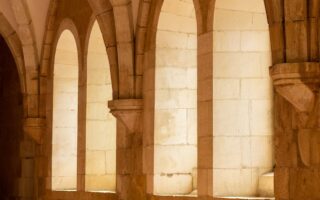I am a creature of habit. I like to repeat things over and over again. I like the things that are familiar. I find strength, depth, and meaning in the repetition. The discipline of repeating was ingrained in me as a child through my participation in competitive gymnastics. Gymnastics practices consisted of repeating routines over and over again striving always to improve them, to perfect every movement, every position in the routine. The beauty of this discipline is that repetition makes space for freedom. As the movements in a routine become increasingly familiar, space is made for artistic freedom. Familiarity with the movement allows one to know the movement so well that there is room for play, for the artistic flair, for expressing the joy of rising above the work in the movement and allowing the movement to come from a deeper place within.
The discipline I learned in gymnastics has shaped my approach to theology. If I find a good book, I will re-read the book several times finding deeper and deeper appreciation for the theological insights that come through the reading. The insights register more deeply within me becoming part of the way I think, part of the way I see the world. I also enjoy repeatedly teaching a course until I know the material so well that I have the freedom to play with the insights that arise from the comments and questions students raise in class. I know some people who thrive on the new and the unexpected, who want new experiences, escape from the drudgery of routine, excitement, drama, travel. I am not one of them. I like the familiar, the expected, the depths of everyday experience.
Repetition is built into being a grandmother because while the experience of each grandchild is new, buried within the new experience is the memory of mothering the parent of your grandchild. That memory is triggered by a hint of familiarity in the smile, the shape of the eyebrows, or the tilt of the head of your grandchild and for me it seems to be an amazing miracle that not only did I have the joy of parenting three amazing, life giving children but I now have the privilege of participating in life with their children as well. The depth of ordinary, everyday life yields a rich harvest of joy.
Listening for the depths, learning to hear the wisdom lying beneath the surface of everyday life, handing yourself over to the mystery that unfolds in our ordinary relationships demands attentiveness and takes time. Routines are a pathway through life that help us to see more clearly the spaciousness available in our daily lives, the spaces to breathe, to connect to ourselves, and to remember God.
We can learn a lot about ourselves by studying our routines. When I teach the Rule of Benedict to students at St. Vincent College, I ask the students to reflect on their daily routines. The Rule of Benedict lays out a daily routine for monks to follow. Ora et labora, prayer and work, are the focus of the routine. The Rule prescribes time for prayer, time for work, time for eating, sleeping, and waking. The times vary slightly to relate to the seasons. For those of us who live outside of monasteries this prescribed life might appear daunting and burdensome, and yet, if we pay careful attention to our lives, we will notice that we all have rules, we all have routines.
If we are brave enough to study our rules and routines, we might see more clearly the things we value. We might be surprised at how much time we spend on social media even though we claim to want to have more time for solitude. We might find that though we want to exercise more, we sacrifice this time again and again to attend to other’s demands. Awareness of the way we spend our time, the routines we keep, can help us to shift to a life more fully rooted in our integrity. More importantly, awareness of our routine can help us to find the spaces in our days, spaces we can nourish, grow, and cultivate, spaces for breathing, coming home to ourselves, praying, journaling, and living more fully for God.
When I was young the adventure of living always pointed to new horizons, new challenges, and new relationships. I am sure this is a vital and important stage of life but as I grow older, I find that the adventures of my life no longer lie in going out to other places or finding new horizons. Instead, I find myself excited every morning to receive the gift of an ordinary day. As the ordinary life I have been gifted unfolds, I try to remember to stay open to the possibility of glimpsing mystery in each person I encounter, to become more aware of spaces in my day that are rich in silence, and to attune my heart to moments of wide-open spaciousness inviting me to seek God’s presence by coming home to myself.














